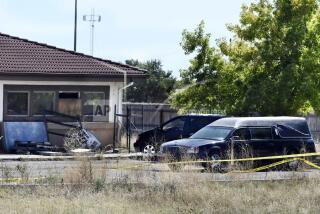Mortuary officials disciplined for mishandling troops’ remains
- Share via
Reporting from Washington — The Air Force said Tuesday that it had disciplined three top officials at the military’s main mortuary in Delaware for “gross mismanagement” after finding that they twice lost track of body parts of U.S. troops killed in Afghanistan, and cut off a deceased Marine’s arm bone without his family’s consent.
An 18-month Air Force investigation said the three officials failed to take action “despite indications that procedures were inadequate” for tracking human remains at the Dover Air Force Base mortuary, which has handled most of the more than 6,000 U.S. service members killed in Iraq and Afghanistan over the last decade.
The mistakes at Dover are similar in some respects to two other scandals that have rocked the military in recent years.
Last year it was revealed that officials at Arlington National Cemetery had misidentified some human remains and buried some service members in the wrong graves, prompting an investigation of the nation’s largest and best-known military cemetery.
In 2007, news reports revealed that some soldiers wounded in Iraq and Afghanistan were forced to live in substandard outpatient facilities run by the Walter Reed Army Medical Center, the military’s most famed medical facility. The center has since been closed.
The latest revelations provided fresh evidence that the Pentagon’s preeminent institutions for handling America’s dead and wounded soldiers, sailors, Marines and airmen were unprepared for the conflicts of the last decade, and continue to have problems.
At Dover, body parts were lost when badly mangled bodies arrived in pieces, officials said.
In one case from April 2009, fragments of an ankle bone embedded in human tissue were recovered from an Air Force F-15 fighter that crashed in Afghanistan. The plastic bag containing the labeled remains was later found empty during normal processing, with a slit in the side of the bag.
A few months later, a piece of human tissue an inch or two in length apparently from a soldier killed in Afghanistan was lost the same way: The bag containing the piece was found empty, with a slit in its side. Officials said they did not suspect foul play or deliberate mishandling.
In a separate report, the Office of Special Counsel, an independent agency charged with investigating whistle-blower complaints, excoriated the Air Force for failing to quickly notify families of service members whose remains were mishandled, and for not taking more severe disciplinary action against the three officials involved.
The officials were identified as Col. Robert H. Edmondson, the mortuary’s former commander; Trevor Dean, his former deputy; and Quinton R. Keel, the former mortuary director. Edmondson received a letter of reprimand from the Air Force, effectively ending his military career. Dean and Keel were demoted within the last two months and moved to nonsupervisory jobs.
But Carolyn Lerner, the head of the Office of Special Counsel, said Keel and Dean had shown a “pattern of negligence, misconduct and neglect” and that Edmondson had exhibited a “failure of leadership.”
She added, “I question whether the Air Force has taken appropriate disciplinary action.”
Her office, which forwarded the allegations to the Pentagon in May and July 2010 after three employees at the mortuary lodged whistle-blower complaints, said the Air Force had taken a narrow view of what went wrong at Dover between 2008 and 2010.
She said evidence indicated that Keel “knowingly misrepresented” to investigators his actions in ordering the Marine’s arm bone to be cut without telling his family. The family wanted a public viewing, but an embalmer felt that the Marine’s body was too badly damaged to be deemed “viewable.”
Keel ordered them to remove the arm bone, so he could be dressed in his uniform. The Air Force investigation concluded the family had given its “implied consent” to do so by asking for a public viewing, a decision that Lerner called “unfounded.”
Lerner also said Keel had “abruptly terminated” one of the whistle-blowers and another employee who was cooperating with investigators last year. Both decisions were quickly reversed.
At a Pentagon news conference, Gen. Norton Schwartz, the Air Force chief of staff, said there was “nothing more sacred” than proper handling of the nation’s war dead, and he acknowledged “systemic failures” at Dover.
But he defended punishments meted out to the three officials and said the Air Force made the right decision not to inform the families until this weekend, even though the investigation was completed months ago.
More to Read
Sign up for Essential California
The most important California stories and recommendations in your inbox every morning.
You may occasionally receive promotional content from the Los Angeles Times.













